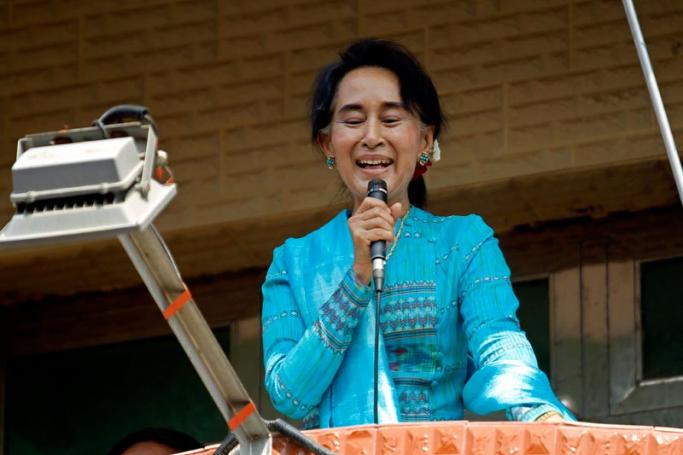A recent interview with Daw Aung San Suu Kyi by the international press has sparked controversy over whether her National League for Democracy might really boycott the upcoming 2015 general election.
Reuters published their interview with Daw Suu in Nay Pyi Taw on April 3. The interview covered a wide range of issues and contained a suggestion that boycotting the election was an “option” if the military-drafted 2008 Constitution that bars her from becoming president remains unchanged.
The interview raised a question mark over whether Daw Suu was really considering a boycott.
“We don't think that boycotting the election is the best choice," said Daw Suu, when asked whether her party would run with the constitution unchanged. "But we're not ruling it out altogether. We are leaving our options open.”
Political analysts and observers told Mizzima that the reason why Daw Suu mentioned a possible boycott was to exert political pressure on the ruling Union Solidarity and Development Party and President U Thein Sein who appeared reluctant to amend the constitution substantially, reflecting frustration that the elections would not be free and fair.
Political analyst Than Soe Naing said, “I think she planted a ticking time bomb for a speedy and substantial amendment of the constitution and expressed her thought of considering a boycott of the general election as a tactical line as part of the struggle.”
The NLD boycotted the 2010 general election as they claimed it would not be free and fair but later the party contested the 2012 by-election by announcing their objectives of amending the constitution, national reconciliation and internal peace, and the upholding of the rule of law. The party won a landslide victory in this by-election and picked up 43 seats in parliament. Thirty-seven of the NLD’s seats are in the 440-seat lower House of Representatives. The 2008 Constitution stipulates that 25 percent of the seats in parliament are held by military representatives.
Peace and Social Justice Organization Executive Director Dr Thaung Tun told Mizzima that he assumed that Daw Suu and her NLD party were frustrated by the delay in amending the constitution and the weakness in cooperation by the ruling circle in this regard.
However, President U Thein Sein and Commander-in-Chief of the Armed Forces Min Aung Hlaing have both said separately that they would not allow the 2015 general election to be derailed.
Political analyst Than Soe Naing said the suggestion of a boycott of the general election by Daw Suu was based on three facts. They were that the amendment of articles 436 and 59(f) were unlikely to be included in the Constitution Amendment Bill to be passed by parliament soon; the six-party talks are being delayed by President U Thein Sein and are not likely to resolve the crisis of amending the constitution; and the fact that the United States and other Western countries were talking about only about the importance of the election and were weak in talking about amending the constitution, he said.
Than Soe Naing said: “I speculate that according to Daw Suu’s basic vision, an election without amending the constitution cannot be free and fair. In the meantime, the ruling party and government are trying to prolong their rule. Under these circumstances, there can be little hope of a free and fair election.”
Another political analyst Kyaw Lin Oo said: “I think she wants to amend the constitution before the election, and therefore she spoke like that to exert pressure on the government.”
Though the NLD party has not yet officially decided to take part in the general elections, they have already formed a Party Campaign Committee and a Central Electoral Roll Scrutinizing Committee.
NLD party Central Executive Committee member and Central Electoral Roll Scrutinizing Committee head U Tun Tun Hein said, “If the election is not free and fair, there will be likelihood of boycotting it.”
“But judging election whether it is free and fair depends on the party CEC’s decision. I have no authority to decide on it,” he added.
Why Daw Suu says boycotting the election an option
06 April 2015
Why Daw Suu says boycotting the election an option












